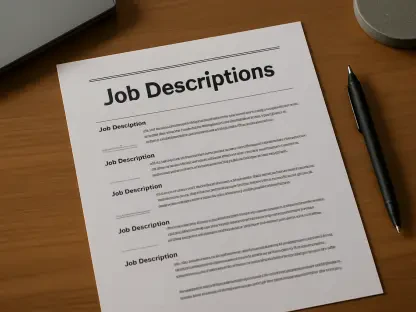The landscape of recruitment in the United Kingdom is undergoing a substantial transformation as skills-first hiring emerges as a pivotal strategy for many employers. Against the backdrop of economic pressures and evolving technologies, companies are shifting focus from traditional credentials like degrees to skills and competencies that better predict job performance. Recent data reveals that 77% of UK employers have adopted skills tests to assess potential hires, favoring this method over the conventional reliance on resumes. About half of these employers have also dispensed with degree requirements, highlighting an industry-wide shift towards valuing practical skills that address immediate business needs. This movement is largely driven by economic uncertainties and the increasing role of automation, compelling organizations to employ more strategic approaches in talent acquisition. The seismic shift from conventional hiring modalities suggests that the recruitment industry’s reliance on academic achievements is diminishing in favor of finding adaptable, skilled, and culturally compatible talent capable of thriving in dynamic workplaces.
The Role of AI in Modern Recruitment
Artificial intelligence has become an influential force in reshaping how businesses approach recruitment, with 61% of UK employers integrating AI tools into their hiring processes. The impact of this integration has been overwhelmingly positive, as evidenced by 97% of these employers reporting enhanced results in identifying suitable candidates. This adoption stems from the necessity of navigating an increasingly competitive job market and addressing the complexities of differentiating between numerous qualified applicants. However, notwithstanding technological advancements, sourcing top talent remains arduous, with 62% of employers encountering greater challenges compared to previous years. Similarly, 72% of job seekers experience heightened obstacles in securing positions, indicating a broader reassessment of what constitutes effective hiring practices. Amid this reassessment, AI-enabled tools aid in evaluating soft skills that address the nuances of teamwork and communication, with 69% of companies using skills tests now considering these attributes critical. The tools assess attributes such as critical thinking, adaptability, and cultural fit—areas in which human qualities reign supreme.
Emphasizing Soft Skills Over Tech Skills
As the demand for AI-specific skills wanes, organizations increasingly prioritize evaluating soft skills alongside technical proficiencies. Demand for AI expertise has seen a decrease from 52% to 38%, reflecting a conscious effort by companies to achieve a more balanced assessment of technical capabilities and interpersonal qualities. Such a two-pronged approach is instrumental in evaluating values and behaviors that distinguish human potential from purely mechanized responses. It underscores the rising belief among a majority that a comprehensive understanding of an applicant’s versatility enhances hiring success rates. This view is shared by 86% of job seekers and 77% of employers, attesting to the collective acknowledgment of a more person-centered hiring perspective. TestGorilla’s insights suggest that this holistic approach not only trims recruitment expenses but also curtails instances of mis-hires, simultaneously bolstering employee retention. By embracing skills-first hiring, firms are better positioned to harness diverse talents in ways traditional academic measures might overlook.
Benefits and Challenges of Skills-Based Hiring
The skills-first hiring model presents numerous benefits for organizations poised to leverage its potential in building inclusive cultures, even amidst declining momentum in global diversity, equity, and inclusion (DEI) initiatives. An impressive 84% of UK employers are committed to nurturing such environments, recognizing the critical role diversity plays in innovation and competitiveness. Furthermore, job satisfaction levels among new hires reflect the success of this approach, with 85% reporting heightened contentment. The decline in emphasizing degree credentials, noted among 50% of UK and 57% of US employers, marks a significant transition to competence-driven evaluations. Nevertheless, challenges persist, such as budget constraints that pose limitations on the wider implementation of sophisticated skills assessment tools. Despite this, the skills-first hiring methodology paves the way for more representative workplaces by assessing candidates based on abilities rather than traditional academic benchmarks. This shift enables employers to navigate the complexities of recruitment, blending advanced technology with intrinsically human competencies to adapt within a rapidly changing economic landscape.
Navigating the Future of UK Hiring Practices
The recruitment landscape in the United Kingdom is experiencing a significant transformation as skills-first hiring gains traction among employers. Amidst economic challenges and evolving technology, companies are increasingly valuing skills and competencies over traditional credentials like degrees. A recent survey indicates that 77% of UK employers have implemented skills tests to evaluate candidates, favoring these over the traditional reliance on resumes. Approximately half have also eliminated degree requirements, underscoring a shift toward prioritizing practical skills that meet immediate business demands. This change is fueled by economic uncertainties and the rise of automation, prompting businesses to adopt more strategic approaches in hiring. The traditional focus on academic achievements is giving way to a preference for adaptable, skilled, and culturally compatible individuals who can thrive in dynamic environments. This evolution reflects a broader industry trend where the emphasis is on finding talent equipped to handle the complexities of modern workplaces.









